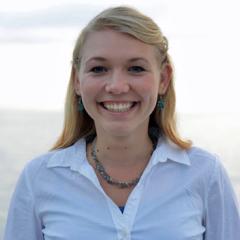Straight From The Scientist: Dr. Natalya Gallo
Editor's note: The following is a post by our policy engagement training partners, COMPASS. It is an abridged version of a UCSD TedX Talk by Fellow Natalya Gallo. Her preparation and persistence enabled her to become a resource for international policy makers, bringing ocean science to climate discussions.
I am an oceanographer and a marine ecologist. Let me tell you about one of the most meaningful experiences I had during my PhD. I was attending my first United Nations Framework Convention on Climate Change Conference of the Parties (COP).
My first week at the COP was overwhelming. I loved sharing my scientific knowledge with attending delegates but I quickly found that the questions I was receiving were not the ones that I was prepared to answer as a scientist. I was trained to accurately describe problems; I was being asked to think creatively about solutions, and I was being challenged to think about the social implications of my scientific research. I left COP19 with two big questions: How could I leverage my skills as a scientist to help tackle these difficult global challenges, and how could I inspire other scientists to engage in the policy realm as well?
I knew that to have an impact as a scientist I needed to keep learning about the policy world. So, in 2014 I took part in Advanced Policy training for scientists with the organization COMPASS. From this, I learned that timing is critical for effective science-policy interactions. Timing could be the difference between the same information having no impact or having a major impact, so recognizing decision points was critical. Another important point I learned was that building relationships was key to having effective science-policy interactions. This required understanding the nuances of how policy makers felt about an issue, meaning that I needed to start asking questions. Were negotiators concerned about the lack of inclusion of ocean issues within the negotiations? Why was this the status quo? What would negotiators like to see that could help this process?
Armed with this new insight, I went to COP21 in Paris prepared. I brought my scientific expertise to share with negotiators, but I also had an informed understanding of the political process of the COP, and the familiarity of the evolving Paris Agreement text. So, when oceans were finally introduced into the draft text during the COP21 negotiations, only to be removed the following day, I caught that and immediately updated interested negotiators and the ocean science community. I started putting together daily factsheets that clarified how inclusion of oceans was evolving within each new draft of the Paris Agreement text and providing these to interested negotiators. It was a long, and delirious two weeks for everyone attending, but in the end we were there to witness the adoption of the Paris Agreement. And, yes, oceans were included in the final text.
Before I went to my first COP, I had reservations. The truth is that those reservations are still there before every policy interaction. “What can I, as a scientist, offer? Should I even be here?” These are deep-rooted. But the reason I keep showing up, the reason I’m here today, is because after every interaction I’ve left thinking, “Wow, it is so important for scientists to be a part of these conversations.” It matters. We can’t solve the great societal challenges without scientists engaged and at the table. That’s why I’m here to say, “Your voice is your impact. The world needs your voice. Use it.”

